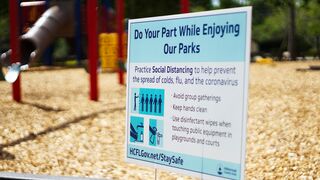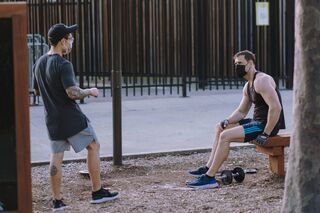
In March, as many countries sheltered in place or imposed restrictions on residents, many felt the absence of connection and community. Whether physical separation from family, or isolation and loneliness, there have been widespread psychosocial impacts of the pandemic that have stretched across people of many backgrounds.1
As restrictions then loosened in May and June,2 photos from around the world indicated that people were once again connecting, businesses were reopening, and people were traveling.3 Life as it once was seemed to resume in some areas. As cases once again surge, and the United States reaches a new peak in cases,4 it is imperative that we reflect on what we longed for as we sheltered-in-place: community.

It is community-focused behavior that has the power to shift the trajectory of our positive cases in the United States. Wearing a mask, social distancing, respecting the rules that businesses establish to protect employees and customers – all of these are small, but powerful, acts to acknowledge that the world is bigger than us as individuals.
While all of us, myself included, may not have a role in developing a vaccine or treatment for COVID-19, that does not mean we are powerless to act. We are part of a whole, and though it may be easiest to be apathetic as we face the small size of our contributions, communities cannot change without individual behavior change.
Is it inconvenient and effortful to act with others in mind? Sure. Important to remember is that while self-focus serves its purpose in many contexts, in a global pandemic, it may be prudent to consider an alternative perspective. For those living in communities, whether densely or sparsely populated, we need others to survive—to maintain our food supply, to provide services we cannot do alone, to provide health care, and to serve any number of other functions. An exhaustive list is near impossible, and this reflects the comprehensive nature of our communities. Every person has something to contribute. As an individual within a community, we can choose to act with this community in mind, even when that requires prioritizing community ahead of convenience.

It is time that we shift our perspective toward that of community resilience, rather than our individual preferences and patterns. The positive case rates and death rates in countries that have prioritized communities and countries are staggeringly low in comparison.5 Now is the time for action. We must prioritize our communities before we once again are relegated to our homes in isolation, or worse, lose more members of our community.
As we venture out into our communities, ask not what can I do for me, but what I can do for those around me? Protect the life of everyone in our communities by wearing a mask and social distancing—for some, it is the difference between life and death.
References
1. Douglas, M., Katikireddi, S. V., Taulbut, M., McKee, M., & McCartney, G. (2020). Mitigating the wider health effects of covid-19 pandemic response. BMJ, 369. https://www.bmj.com/content/bmj/369/bmj.m1557.full.pdf
2. Lee, J.C., Mervosh, S., Avila, Y., Harvey, B., & Leeds, A. (July 1, 2020). See How All 50 States Are Reopening (and Closing Again). Retrieved from: https://www.nytimes.com/interactive/2020/us/states-reopen-map-coronavir…
3. CNN. (June 26, 2020). Here are the areas that are starting to reopen. Retrieved from: https://www.cnn.com/2020/04/24/world/gallery/coronavirus-after-lockdown…
4. New York Times. (July 1, 2020). Coronavirus in the U.S.: Latest Map and Case Count. Retrieved from: https://www.nytimes.com/interactive/2020/us/coronavirus-us-cases.html.
5. Roser, M., Ritchie, H., Ortiz-Ospina, E., & Hasell, J. (2020). Coronavirus Pandemic (COVID-19). Published online at OurWorldInData.org. Retrieved from: https://ourworldindata.org/coronavirus


